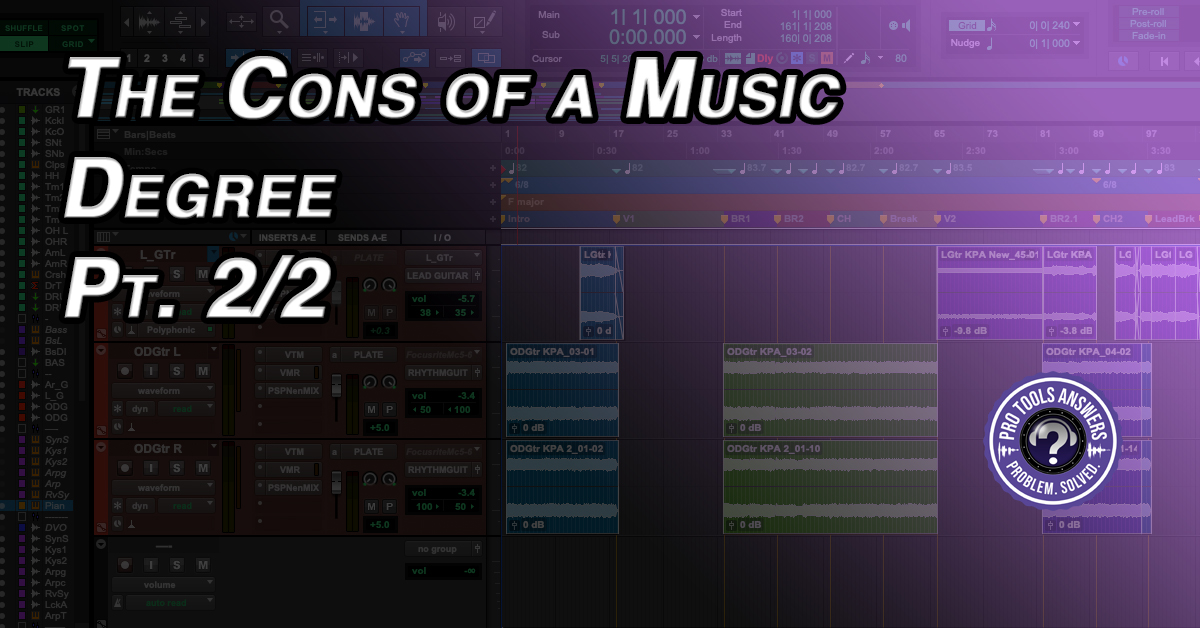One of the questions that pops up on the forum is simply the title above. The responses, as you can imagine – are mixed. Some say ‘yes’ and some say ‘no’. The problem with answering this question is that it’s so subjective to experience.
If you haven’t yet read “Is a Degree in Audio Engineering worth it? The Pro of a Degree.” – read that first. This article was written to be read second.
So lets delve into why a Degree might not be worth it for you.
The Cons of a Degree
- The cost
In the UK – the cost of taking a Degree, currently, is £9,000 per year. Most degrees are 3 year courses so you’re in it for a £27,000 debt.
The good news is that this debt will largely be invisible for the majority of your life, and you’ll only start to pay it back when you reach an income threshold of £26,000 per year. If you’re employed by a studio (if you’re lucky enough, rather!) – you’ll need to earn just under £27,000 per year before the Gov starts taking the money from you pay.
Of course, this will change from country to country.
Further good news for self employed – although things do get a little more complicated – is that it’s not much different if you’re a sole trader (as a long of engineers are). The threshold is still similar, but income for a sole trader is calculated based on ‘net’ income (income after all allowable expenses) it’s highly likely that you’d need to earn alot more money before the repayments will kick in.
(Bare in mind that we’re experts in Pro Tools, we’re not financial advisors! Any financial discussion is anecdoatal and conversational, does not constitute formal financial advice and will require you to conduct your own research according to your own teritory!)
2. It might not be required!
We went into a lot of good detail about why a Degree is required but it might also be right for you that Degrees aren’t always required.
For example, if you have no intention of going for employed positions and your particular DNA and personality is such that you can develop the skills you need to do a professional job for your clients, a client may not care whether you’re degree trained or not.
It might be that your career path will be set by taking a job that a family friend or family member already in the industry has earmarked for you already. In which case, you already have a job for when you’re ready for it!
If this describes you – you’re incredibly lucky and your peers will hate you for it!!!!
If you think that you can make it without a Degree – you would be advised to research heavily! Speak to as many people as you can in both camps – those with and those without – who are doing well in the industry. You’d have to be very honest with yourself that your research samples are of a good quality and that your skills and personality are up to the task because it’s hard out there!
3. Are there other routes – apprenticehips for example?
The concept of the apprenticeship is a hot topic at the moment. Governments love them and they do give you the opportunity to take a job and be trained with a paycheque.
But will you find an apprenticeship in a studio where a job will be waiting for you at the end?
I’m not say that they aren’t out there, and won’t be out there, but if they are – the competition will be incredibly fierce.
Cons – Conclusion
Honestly, I’ve wracked my brains and I can’t think of any more cons to taking a degree. There aren’t many. The debt is usually the thing that people worry about the most, but because it’s largely invisible and the repayments are usually so low that it’s really not worth worrying about. Seriously – if you’re paying £150+ per month for your degree repayment, you’re earning enough that you won’t notice £150 disappearing from your wage!



